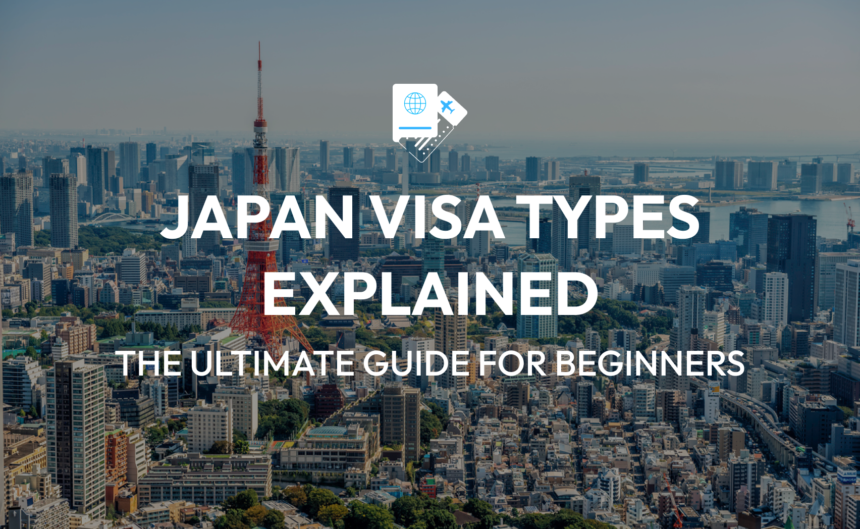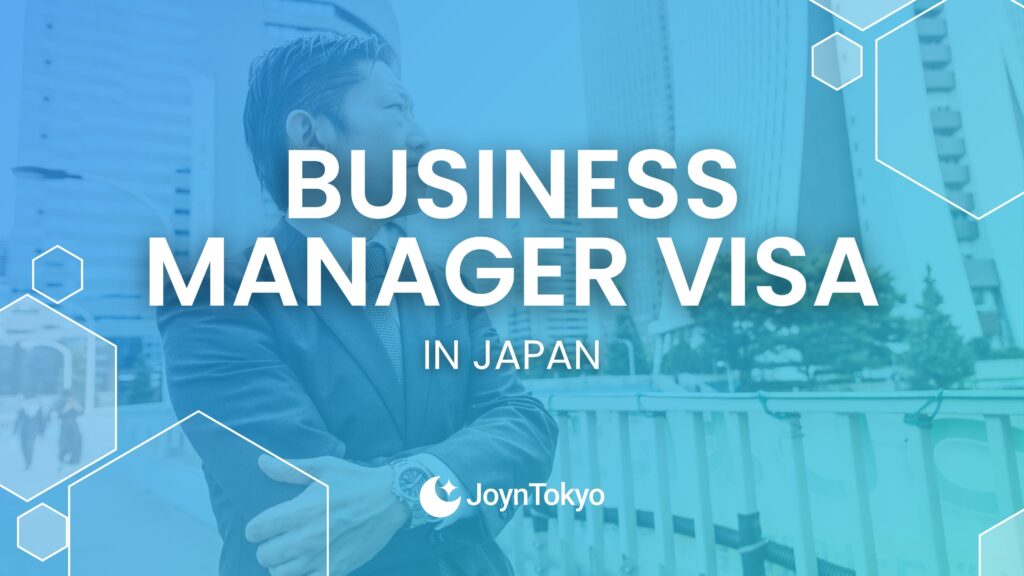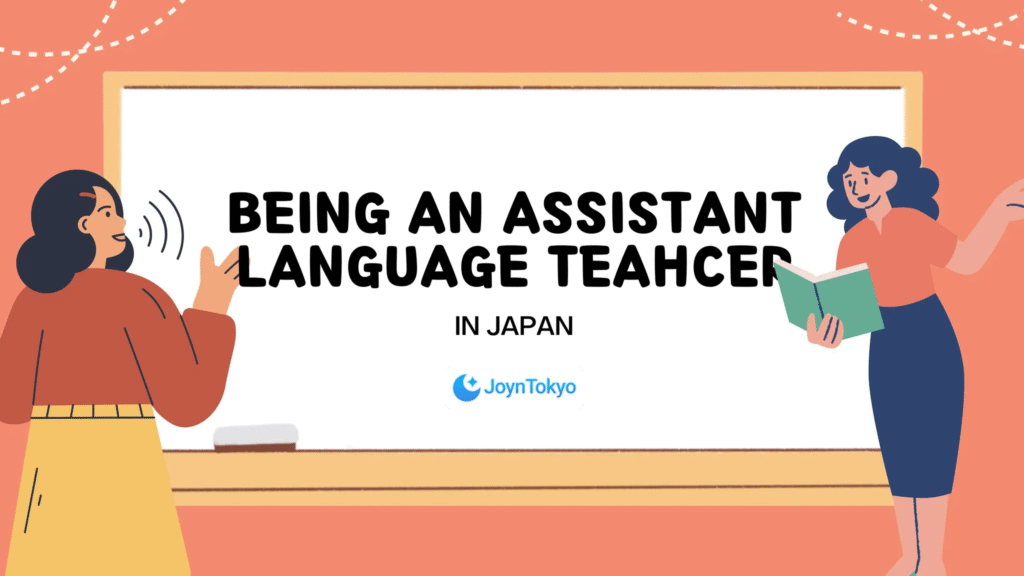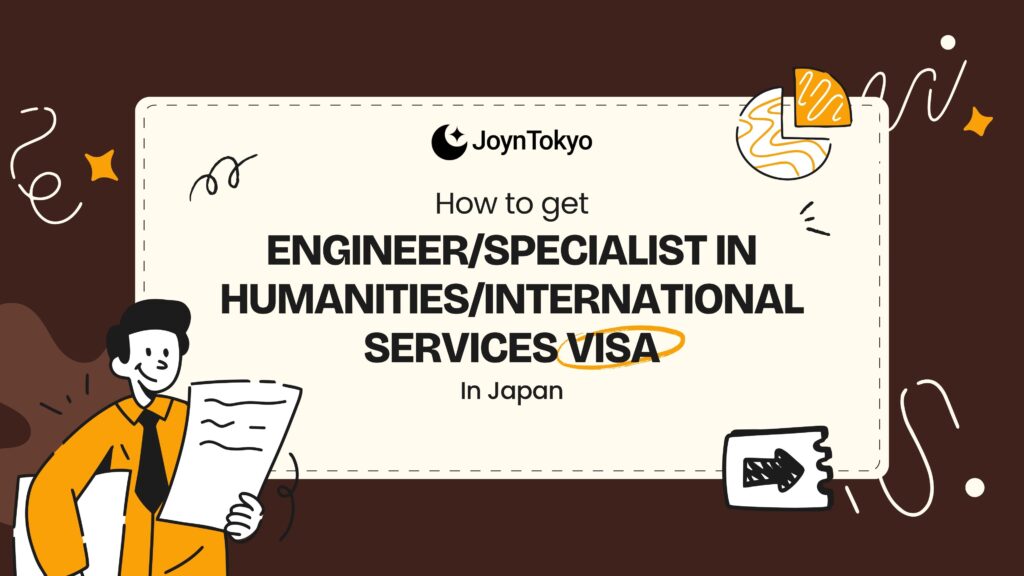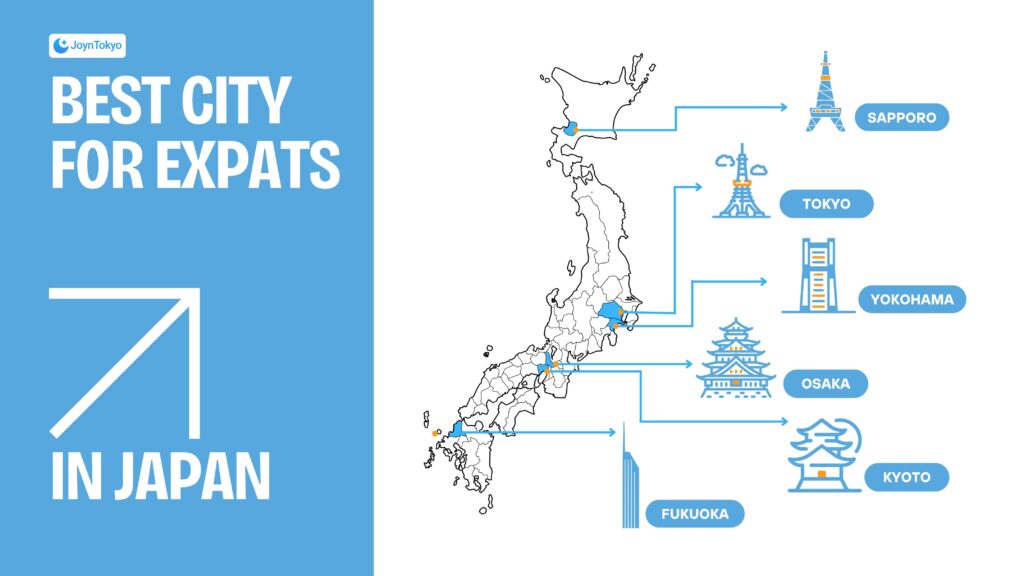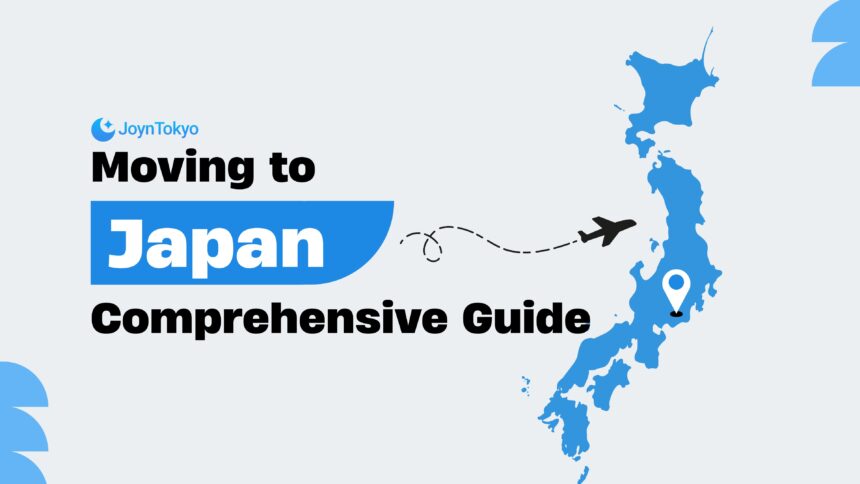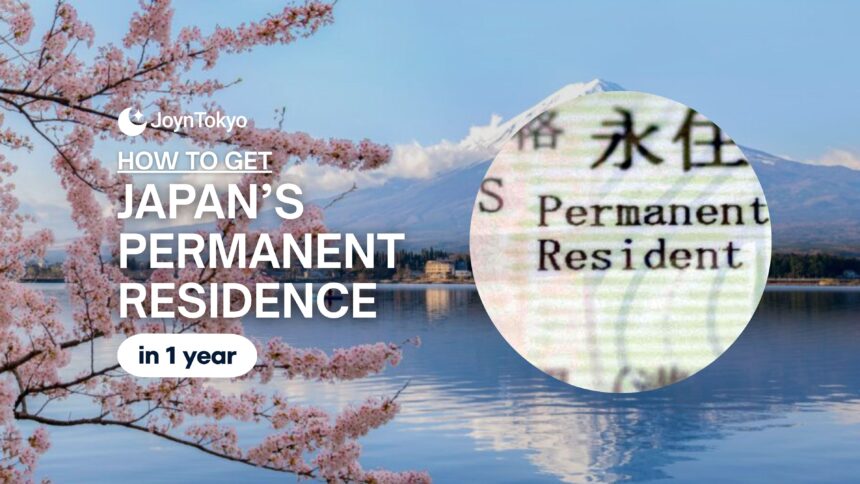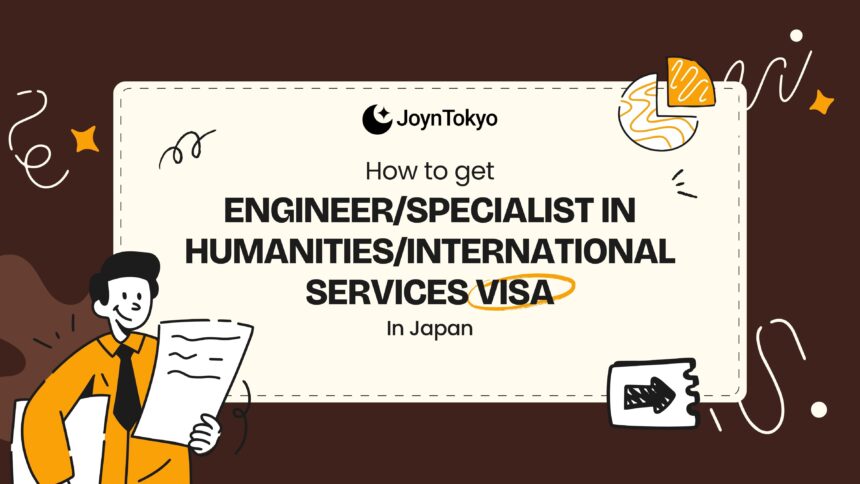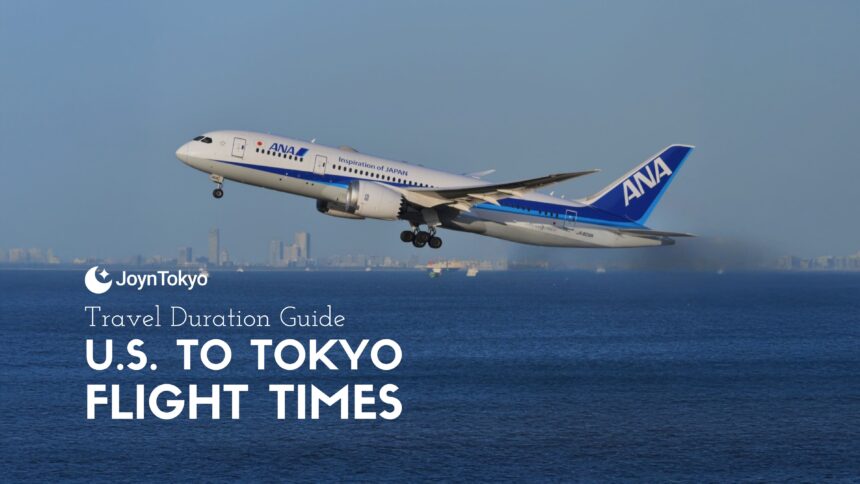If you’re thinking about moving to Japan, figuring out the right visa for the correct residence status is a crucial first step. Each visa category outlines what activities you can legally engage in and how long you’re allowed to stay. In this article, we’ll introduce the main types of Japanese visas, helping you decide which one best fits your goals.
Overview of Japan’s Visa Categories
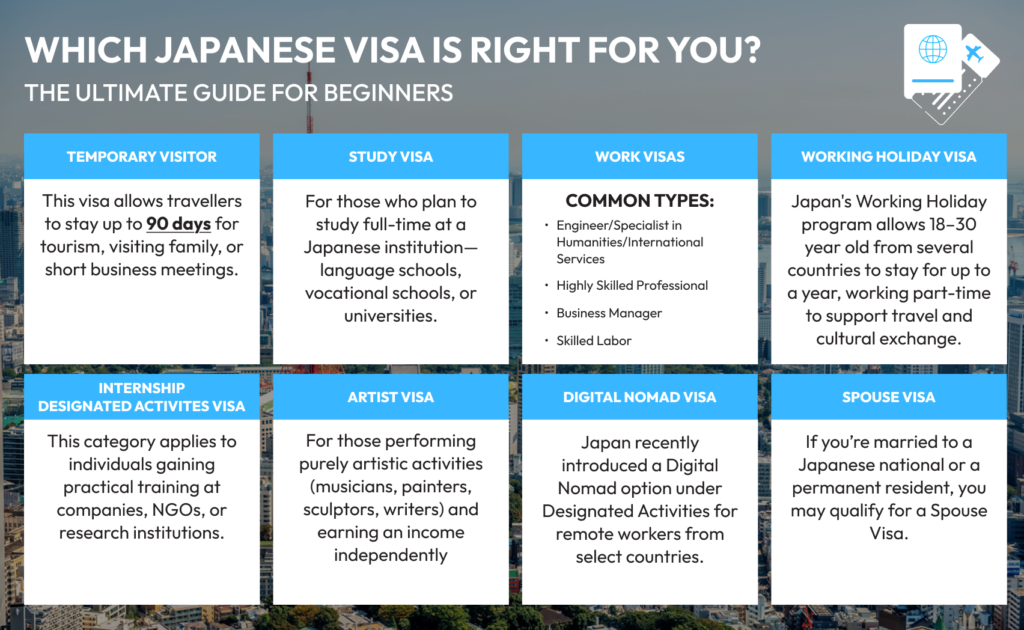
Japan’s visa categories are defined by the Immigration Services Agency, a department of the Ministry of Justice. In total, there are 29 different statuses of residence, ranging from short-term stays to permanent residency. Below is an overview of the major groups.
Diplomatic Visa
The Diplomatic Visa is granted to individuals visiting Japan on behalf of their governments. This includes heads of state, ambassadors, and career diplomats, as well as members of diplomatic missions and their families. It is strictly limited to official assignments such as negotiations, ceremonies, or treaty discussions.
The visa is valid for the duration of the posting or mission and may be renewed as long as the diplomatic assignment continues. Holders are generally entitled to privileges and immunities under the Vienna Convention on Diplomatic Relations.
Official Visa
The Official Visa applies to foreign nationals traveling to Japan for government or international organization duties that are not purely diplomatic. This includes government officials attending conferences, consular staff, and employees of organizations such as the United Nations or World Bank.
The validity period is usually tied to the mission or assignment and may be shorter than a diplomatic visa. While holders enjoy some exemptions and courtesies, the level of privileges is lower compared to those under a Diplomatic Visa.
Japanese Work Visa
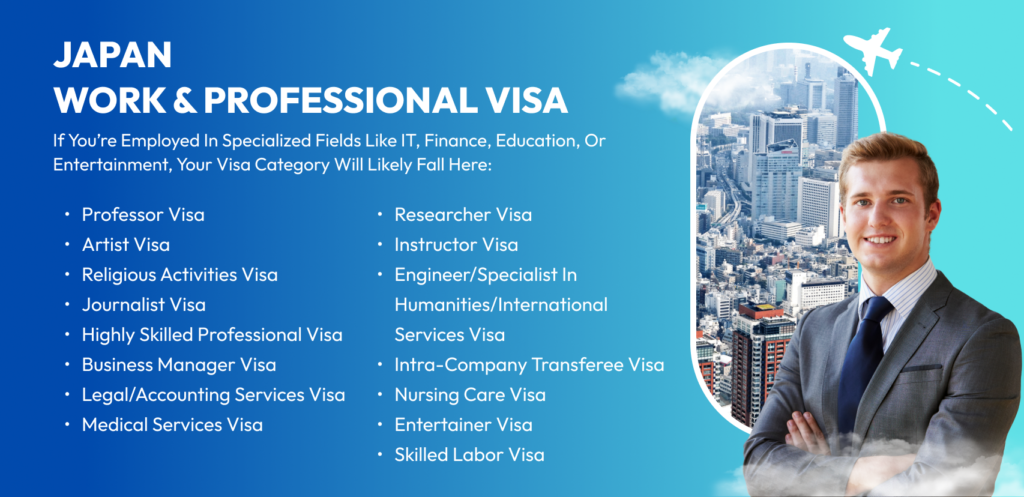
Japan provides a wide range of visa categories for foreign nationals who wish to live and work in the country. These visas are designed to attract talent across specialized fields such as academia, culture, finance, healthcare, technology, and business. Each category has specific eligibility requirements, validity periods, and limitations on permitted activities. Below is an overview of the main work-related visa types.
Professor Visa
The Professor Visa is issued to foreign nationals who work in higher education institutions such as universities, colleges, and equivalent academic organizations. It applies to professors, associate professors, lecturers, and researchers who provide formal instruction or conduct academic research.
To qualify, applicants must hold a contract with a recognized educational institution in Japan and typically need advanced academic qualifications such as a master’s or doctoral degree. The visa can be granted for periods ranging from one to five years, depending on the contract length, and is renewable. Holders are expected to demonstrate both academic credentials and the ability to contribute to Japanese education and research.
Artist Visa
The Artist Visa is designed for individuals pursuing artistic activities that generate income in Japan. It applies to creators such as painters, sculptors, musicians, writers, and other professionals engaged in the arts.
Applicants must prove their artistic ability through evidence of achievements, professional recognition, or sponsorships. They are also expected to show sufficient financial stability to support themselves while living in Japan. The visa duration depends on the nature of the artistic activities, and renewals are possible if the applicant continues to produce artistic work. Unlike the Entertainer Visa, which covers commercial performance, the Artist Visa focuses on independent artistic expression.
Religious Activities Visa
This visa is granted to missionaries, clergy, and religious workers dispatched by foreign religious organizations to Japan. It allows individuals to engage in missionary work, clerical duties, or other religious activities officially recognized by their sending institution.
Applicants must provide proof of assignment and financial support, since income is typically supplied by the sponsoring religious body rather than earned within Japan. The visa is usually issued for one to five years, depending on the assignment, and can be extended if the work continues.
Journalist Visa
The Journalist Visa applies to foreign correspondents, news reporters, photographers, television crews, and freelance writers who are contracted by overseas media outlets to cover events in Japan. It allows holders to engage in reporting, documentary production, and related journalistic activities.
Applicants must present valid contracts from their media organizations, along with evidence of financial stability. The visa is usually granted for one year at a time but can be renewed as long as the journalistic assignment continues.
Business Manager Visa
This visa is for individuals who plan to start or manage a business in Japan. Applicants must provide evidence of a dedicated office, sufficient investment capital, typically five million yen or more, and a well-structured business plan. The visa also applies to executives and managers overseeing branches or subsidiaries of foreign companies.
The Business Manager Visa is often issued for one to three years and can be renewed if the business remains viable. It is considered one of the more challenging visas to secure, as Japanese immigration authorities carefully review the legitimacy of the enterprise.
Read More
Legal/Accounting Services Visa
This visa allows foreign professionals in law and accounting to practice in Japan, provided they hold the appropriate qualifications. Attorneys must be admitted to practice law in Japan (as bengoshi) or possess foreign credentials recognized by Japanese law. Similarly, certified public accountants must hold Japanese or recognized foreign licenses.
Applicants must also demonstrate affiliation with a registered firm or practice. The visa is usually issued for one to three years and may be extended based on ongoing professional work.
Medical Services Visa
Doctors, dentists, nurses, and other licensed healthcare providers can apply for the Medical Services Visa if they are authorized to practice in Japan. Most applicants must hold Japanese medical qualifications, but in some cases, foreign professionals are admitted under special agreements between Japan and other countries.
Hospitals, clinics, or medical institutions act as sponsors, and applicants must prove both their credentials and their employment contracts. The visa is typically issued for one to three years and is renewable.
Researcher Visa
The Researcher Visa is for individuals employed by public or private institutions in Japan to conduct specialized research. This includes scientists, analysts, and investigators working with universities, government agencies, think tanks, or private corporations.
Applicants must hold a valid contract, provide proof of financial support, and demonstrate the qualifications necessary for their field of research. The visa length is generally tied to the contract, ranging from one to five years, with extensions possible.
Instructor Visa
Foreigners teaching at elementary, junior high, or senior high schools in Japan can apply for the Instructor Visa. It is widely used for foreign language teachers, particularly Assistant Language Teachers (ALTs) under government-sponsored initiatives such as the JET Program.
Applicants must present employment contracts, proof of qualifications such as university degrees, and in some cases, teaching experience. The visa duration is generally one to three years, with renewals based on continued employment.
Read More
Engineer / Specialist in Humanities / International Services Visa
This category is one of the most widely used because it covers multiple professional fields. Engineers working in IT, technology, or natural sciences; specialists in the humanities such as economists, legal advisors, and educators; and international service professionals including translators, interpreters, and designers are all eligible.
Applicants are typically required to hold a university degree or equivalent professional experience. Employment contracts must clearly specify the applicant’s role and qualifications. The visa is usually granted for one to five years and is renewable, making it a common pathway for skilled professionals relocating to Japan.
Read More
Intra-Company Transferee Visa
The Intra-Company Transferee Visa applies to employees of foreign companies who are transferred to offices, subsidiaries, or branches in Japan. To qualify, applicants must have worked at the parent company abroad for at least one year before the transfer.
This visa allows specialists, engineers, and other professionals to continue their employment within the same corporate structure. The validity period ranges from one to five years, with extensions available as long as the assignment continues.
Nursing Care Visa
Introduced to address Japan’s aging population, the Nursing Care Visa allows certified care workers to provide support in hospitals, nursing homes, and home-care facilities. Applicants must complete training and certification in Japan or come under bilateral agreements with countries such as Indonesia, Vietnam, or the Philippines.
Holders are allowed to work full time in caregiving roles, and the visa duration is usually one to five years, depending on the employment contract. Renewals are possible for workers who continue to meet the requirements.
Entertainer Visa
The Entertainer Visa covers a wide range of performing arts and sports professionals, including actors, singers, dancers, athletes, and models. Because of past concerns about exploitation, this category is closely regulated by immigration authorities.
Applicants must provide contracts with reputable agencies and proof of financial stability. The visa is usually issued for short periods tied to the performance schedule, although longer-term stays may be granted for athletes or performers with ongoing contracts.
Skilled Labor Visa
This visa is reserved for individuals with specialized technical expertise in fields such as foreign cuisine, architecture, sports training, aviation, and traditional crafts. Applicants must prove years of professional experience, relevant certifications, and demonstrable skills that are not widely available in Japan.
The Skilled Labor Visa is generally issued for one to three years and can be renewed as long as the applicant maintains employment in their specialty.
Highly Skilled Professional Visa
The Highly Skilled Professional Visa is aimed at attracting top-level international talent. It uses a points-based system that evaluates applicants on factors such as education, work experience, income, and research achievements. A score of 70 points or more is required to qualify.
This visa covers three main activity categories: advanced academic research, advanced specialized or technical work, and advanced business management. Eligible applicants may include university professors, researchers, IT specialists, and executives managing large enterprises.
Holders of this visa receive several benefits, including permission to bring family members, access to multiple-entry status, and a faster path to permanent residency—sometimes in as little as one to three years, compared to the usual ten. The visa is issued for one to five years and can be renewed if the applicant continues to meet the requirements.
Which Visa Is Right for You?
Given the variety of visa types and rules, choosing the best fit can be challenging. Consider these steps:
- Consider and Clarify Your Purpose
- Studying, working, starting a business, or cultural exchange?
- Check Requirements
- Confirm the specific documents (CoE, financial proof, sponsor, etc.) needed.
- Consult Experts
- Immigration lawyers or certified visa consultants can offer personalized advice.
Remember that switching visa categories later may require meeting new conditions and can take time. Whenever possible, plan ahead based on your mid- to long-term goals in Japan.
This article provides general information only. Visa regulations can change, and individual cases vary. For the latest updates and personalized advice, consult official sources (e.g., the Ministry of Foreign Affairs, Immigration Services Agency) or a legal professional.

